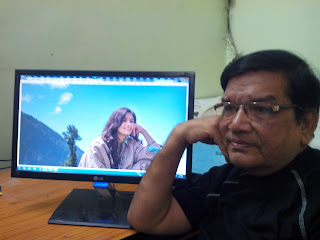Hamari
Pyyari Alia
It can be hailed as the most elegant and cherished love story of Indian History. It is believed that the Mughal prince Khurram fell in love with a simple girl who flew one of the two prized fantail pigeons and on being asked how she could have done such a crime she flew the second one too and said:'like this'! This naive girl went on to become his most treasured and loved wife, Mumtaz Mahal. She was the daughter of Asif Khan and granddaughter of Mirza Ghiyas Beg, both of whom held positions in the Mughal court. (tajmahaltour).
Now look at the jokes about Alia Bhatt on social media sites
1. Alia
Bhatt is so dumb that she thought Pani Puri, Sev Puri are all relatives of
Amrish Puri.
2. Arnab:
What's the first name of Modi?
Alia: Abki Baar
Alia: Abki Baar
3. Einstein
says: Be friends with Alia Bhatt and feel like a genius all the time!
4. When Mary Kom won a Gold Medal in Asian Games Alia
Bhatt congratulated Priyanka Chopra
5. Alia went to buy a national flag on Independence Day
and asked to show it in some other colors, or that she insisted to a shopkeeper
to give her free cholesterol when she bought Sunflower Oil.
When the whole world is rejoicing the youngest Nobel laureate
Malala Yusufjai for her overwhelming achievement of human rights advocacy for education for women,
our most pure, innocent Alia Bhatt has received unparalleled applaud in the
history of Bollywood for being labeled as dumb.
Four lunatics were standing near fence of an asylum when
a car stopped outside on the road and the owner who was driving, got down from
the car to change the tyre since it had gone flat. While in the process he had
taken out flat tyre he accidently strikes the plate where he kept all the four nuts and the nuts
rolled in the nearby drainage. Now the owner was perplexed as how he would
manage to reach to a mechanic, when one of the lunatic suggested that he take
out one nut from each wheel and put stepney with three nuts. He can then go up to
a mechanic. The owner was surprised he asked "Hey, you have solved my
problem. How is that you are in a lunatic asylum."
The man answered " Well, I may be a cranky, but I am
not dumb."
That was the time when being stupid was considered as the worst kind of stigma
society can attach to anyone. Now Alia has surpassed Santa Banta and Blondes in
stupidity.
Is Alia dumb or stupid? Or both?
Dumb, simply put, is when you
don't know any better. This could be on an intellectual, mental, or
educational level. It could also be due to a lack of exposure to certain
behaviors and subsequent reactions, relative to any kind of 'life' situation.
The rate at which you react and whether or not you think first before the
action or reaction is somewhat relative. Definitively though, nothing is more
evident after the fact, or nearly as important as the simple fact that you
didn't know any better at the time.
Stupid, simply put, is when you
know better, but you do it anyway. The first time you do your own laundry
and toss bleach into a load of colored clothing, destroying everything... This
is a dumb mistake. The next time you do laundry, and toss the bleach
into the load of colors again? That is just stupid. You knew better from
the first/past experience, but you did it anyways. (English language and
usage).
Alia
is neither dumb nor stupid.
She is
pretty, innocent, charming, unworldly girl who has chosen to appear what she is
not? Why anyone would do that. On the one hand when Kangana Ranaut in North and
Kajal Agarwal in South has established themselves as the most intelligent heroines
in Indian film industry, why an upcoming actress when labeled as dumb would
rather approve of it. Look at her statements-
"I always say that I rather be stupid than pretend
to be intelligent."
"I think that is very funny. Basically there are
these twitter and Facebook jokes on me, because I am apparently stupid. They
are very hilarious," she said.
"I
don't feel bad at all. I find it very funny. It's a joke and you have to take
it in a funny way. At least, I am crossing somebody's mind at some point of the
day."
And it all started from Karan Johar's talk show Koffee
with Karan when she said that the Indian President is Prithviraj Chavan
during the rapid fire round.
How many actresses do you think know the name of the
President of India. They could be counted on finger tips.
Then why so much hue and cry to culminate it into a meme.
It is an invention of some brilliant mind (a marketing strategist) to encash a
mistake and project an image of a person with whom adolescent youth can
identify and can make fun as well. The statements given by Alia are very
intelligent. A stupid person would never admit that he is stupid.
This is the ultimate glamorization of stupidity.
Bollywood had been doing it in the past. They have glamorized
criminals, vagabonds, tapories, rowdies and Mafioso. They are expert in tilting
negative shades in such a way that audience starts identifying themselves by a
rationality of displacement in their subconscious mind.
But credit goes to Alia Bhatt for doing it off the screen.
So when you are laughing at Alia in all probability she
too is laughing hard at you, for having successfully befooled you. Only time
would show who has the last laugh, but by that time the purpose would have been
served.
©Vipin Behari Goyal



